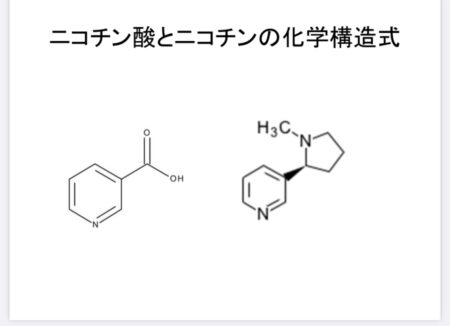Nicotinic acid is different from nicotine
The other day, elderly persons who came to get the 6th dose of the COVID-19 vaccine spent the waiting time after the vaccination while watching YouTube that we have produced.
Then I heard a voice saying, “Nicotinic acid must be the same as nicotine.”

Nicotinic acid and nicotine, although both contain the word nicotine,
are completely different substances.
Nicotinic acid is a form of vitamin B3, also known as niacin.
It is involved in the production of energy and the metabolism of fatty acids and cholesterol
in our bodies.
In addition, nicotinic acid can be ingested through daily diet.
It is also used as a supplement and fortified food to prevent pellagra, a vitamin deficiency.
Nicotine, on the other hand,
is the main component of tobacco and
is absorbed into the body through inhalation of tobacco smoke.
Nicotine acts on the central nervous system and produces effects such as pleasure and stress relief.
Nicotine is addictive and addiction can be caused by smoking tobacco or using nicotine products.
Nicotinic acid was discovered in 1867 by Huber,
who refined nicotinic acid by oxidizing nicotine, a harmful substance contained in tobacco, with nitric acid.
It was named nicotinic acid because it was obtained by oxidizing nicotine.

Nicotine is a naturally occurring ingredient in tobacco with the chemical formula C10H14N2.
Nicotine is biosynthesized in tobacco roots and accumulated in leaves.
Tobacco is known to contain nicotine, but it is also found in other solanaceous plants such as tomatoes, eggplants, peppers, and potatoes (in very small amounts compared to tobacco).
Once in the body, nicotine acts like acetylcholine, a chemical that carries messages between cells.
These effects of nicotine are caused by the binding of nicotine to acetylcholine receptors on the surface of cells.
Nicotine is both a stimulant and a depressant, acting not only to wake the mind but also to relax the muscles.
Nicotine also acts on nicotinic acetylcholine receptors (nAChRs), which are receptors in the central nervous system, to release signaling substances that affect emotion and cognition.
In particular, it acts on the neural circuit called the reward system to bring comfort (activates the dopamine system in the brain).
Nicotine is a type of alkaloid that is highly neurotoxic.
As a chemical substance, it is designated as a poisonous substance.
It is contained in tobacco leaves and is taken into the body through smoke when smoking.
Nicotine in the blood spreads rapidly throughout the body.
It also has a strong vasoconstrictive effect, which constricts capillaries and raises blood pressure.
It is addictive, and children who accidentally eat tobacco leaves can become poisoned and even die.
Nicotine itself is not known to be carcinogenic, but nitrosamines produced by the decomposition and metabolism of nicotine are known to be carcinogenic.

